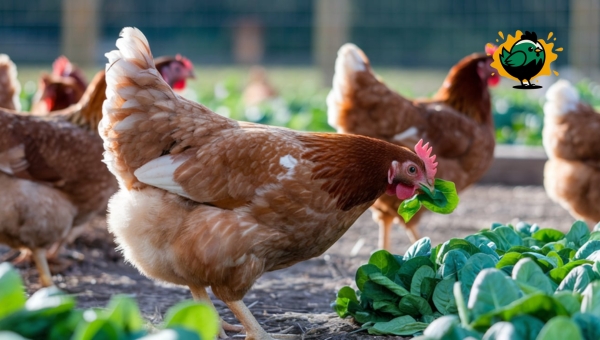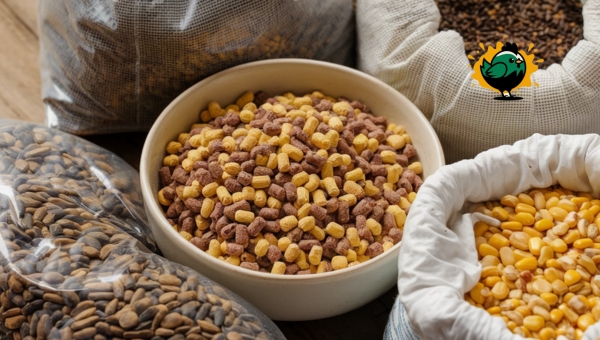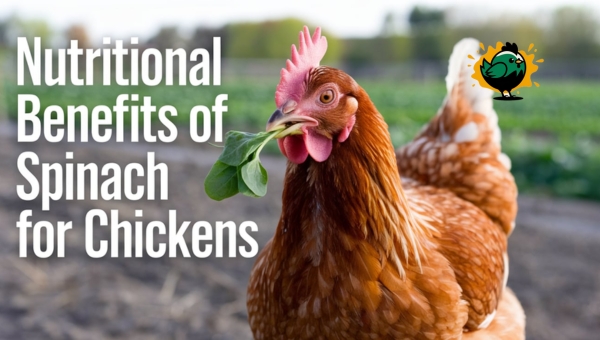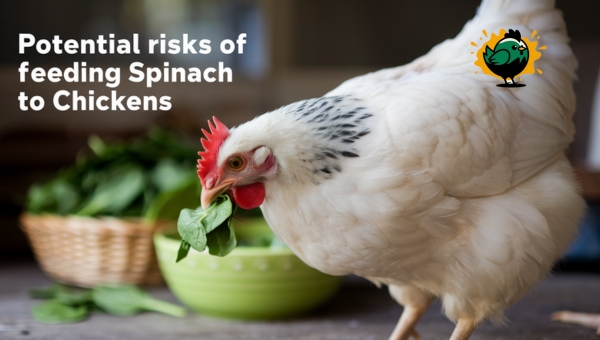Can Chickens Eat Spinach Safely? Find Out Now!

If You’re in your backyard, watching your flock peck around with curiosity. You’ve heard whispers among fellow chicken enthusiasts about feeding them spinach, but you wonder, “Can chickens eat spinach?” This leafy green often finds its way into our salads, but is it fit for our feathered friends?
As we dive into the world of chicken diets, we’ll explore the nutritional benefits, potential risks, and practical feeding tips. By the end of this article, you’ll have a clear understanding of whether spinach should make the menu for your clucking companions. Let’s unravel the mystery together!
Understanding Chicken Diets
Chickens have specific dietary needs that are crucial for their overall health and productivity. A balanced diet for chickens includes grains, proteins, vitamins, and minerals. Grains like corn and wheat provide essential carbohydrates, while protein sources such as soybeans and insects support muscle development and egg production.

Vitamins and minerals are vital for feather health, bone development, and immune function. Calcium, for instance, is necessary for strong eggshells. Fresh greens can also be beneficial, offering additional nutrients and aiding digestion.
However, it’s important to ensure variety and avoid over-reliance on any single food source. Proper diet management ensures chickens thrive, producing quality eggs and maintaining good health year-round.
Nutritional Benefits Of Spinach For Chickens
Spinach is not only a nutritious vegetable for humans but can also offer several benefits for chickens. Chickens can gain essential nutrients from spinach, which can enhance their overall health and well-being. Let’s delve into some of the specific benefits spinach provides for chickens, focusing on vitamins, minerals, and egg quality.

Vitamins And Minerals
Spinach is packed with numerous vitamins and minerals that are beneficial for chickens:
- Vitamin A: Supports vision and immune function.
- Vitamin K: Essential for blood clotting and bone health.
- Iron: Helps in red blood cell production and oxygen transport.
- Magnesium: Important for muscle and nerve function.
- Calcium: Vital for strong bones and eggshell production.
These nutrients play a crucial role in maintaining the health of chickens and ensuring they thrive.
Impact On Egg Quality
Feeding spinach to chickens can positively influence the quality of eggs they produce:
- Improved Shell Strength: The calcium content in spinach contributes to stronger eggshells.
- Enhanced Yolk Color: Carotenoids in spinach can lead to richer, more vibrant yolk colors.
- Nutrient-Rich Eggs: Eggs may contain higher levels of certain vitamins and minerals, reflecting the nutritional profile of spinach.
These benefits make spinach a valuable addition to a chicken’s diet, promoting healthier and more nutritious eggs.
Also Read: Apple Cider Vinegar for Chickens – Essential Benefits
Potential Risks Of Feeding Spinach To Chickens
Feeding spinach to chickens may seem beneficial, but there are potential risks to consider. One important factor is the presence of oxalic acid in spinach, which can affect chicken health. Additionally, it’s crucial to manage the amounts and frequency of spinach given to chickens to avoid negative consequences.

Oxalic Acid Concerns
Spinach contains oxalic acid, which can interfere with calcium absorption in chickens. This interference can lead to weaker bones and other health issues.
It’s important to note that oxalic acid may also contribute to the formation of kidney stones in chickens. Therefore, while spinach can be a nutritious treat, moderation is essential to prevent these potential health problems.
Amounts And Frequency
To ensure spinach is a safe addition to a chicken’s diet, moderation is key. Chickens should only receive spinach as an occasional treat rather than a staple in their diet.
A small handful of spinach once or twice a week is generally sufficient. It’s worth mentioning that observing chickens’ reactions to spinach can help in adjusting the frequency and quantity to suit their health and dietary needs.
Comparing Spinach With Other Greens
When considering the diet of chickens, various greens come into play, each offering different nutritional profiles. Spinach is a popular choice, but how does it stack up against other greens?
Let’s delve into a detailed comparison to understand the unique benefits and potential drawbacks of each option.
- Nutritional Content:
Spinach is rich in vitamins A, C, and K, as well as iron and calcium. These nutrients support overall health and egg production in chickens. However, other greens like kale and collard greens also offer similar benefits. Kale, for example, is high in vitamin K and has strong antioxidant properties, which can contribute to a robust immune system for chickens. - Oxalic Acid Levels:
One of the concerns with spinach is its oxalic acid content, which can bind calcium and potentially lead to deficiencies if consumed in large amounts. In comparison, kale and lettuce have lower levels of oxalic acid, making them safer options for more frequent feeding. - Digestibility:
Spinach is generally easy for chickens to digest, but some greens like chard can be tougher and may require more effort for the chickens to break down. Chard and collard greens can be more fibrous, which might not be as palatable or easy for chickens to consume. - Availability and Cost:
Spinach is widely available and often more affordable than some specialty greens like kale. This makes it a convenient choice for many chicken owners. However, if budget allows, varying the types of greens can provide a broader range of nutrients. - Variety and Enrichment:
Offering a mix of greens, including spinach, kale, and lettuce, can enrich a chicken’s diet and stimulate their natural foraging behavior. This variety not only enhances their nutritional intake but also contributes to their overall well-being by preventing dietary monotony.
Incorporating a range of greens in chicken diets can offer balanced nutrition and promote health. Each green has its unique advantages, and understanding these can help in making informed decisions about what to feed your flock.
Practical Tips For Feeding Spinach To Chickens
Feeding spinach to chickens can be a nutritious treat, but it’s essential to do it right. Chickens have specific dietary needs, and introducing any new food requires careful attention. Let’s explore how you can prepare and serve spinach effectively, and monitor your flock’s health when adding this leafy green to their diet.
Preparation And Presentation
When offering spinach to chickens, how you prepare and present it can make a big difference in how well they accept and digest it. Here are some tips:
- Wash Thoroughly: Always rinse spinach leaves thoroughly to remove any dirt or pesticides.
- Chop Finely: Cut the leaves into smaller pieces to make it easier for the chickens to peck and digest.
- Mix with Other Foods: Combine spinach with other grains or vegetables to create a balanced treat.
- Serve Fresh: Ensure the spinach is fresh and not wilted as fresh leaves retain more nutrients.
Monitoring Chicken Health
Introducing new foods like spinach requires careful observation to ensure the health and well-being of your chickens:
- Watch for Changes: Observe any changes in behavior or droppings, which might indicate digestive issues.
- Limit Quantities: Start with small amounts and gradually increase as you monitor their response.
- Balance the Diet: Ensure spinach is only a part of a varied diet to maintain nutritional balance.
- Regular Check-Ins: Regularly check the health of your chickens to ensure they are thriving on their current diet.
These practical tips can help you integrate spinach into your chickens’ diet safely and effectively.
Conclusion
Incorporating spinach into a chicken’s diet can offer notable benefits due to its rich vitamin and mineral content. However, it is critical to balance these benefits with potential risks, such as oxalic acid concerns. By ensuring proper portion sizes and frequency, spinach can supplement a chicken’s diet without adverse effects.
Comparing it with other greens can also help in providing a varied diet. It’s important to note that monitoring chicken health is essential when introducing any new food. By following these guidelines, you can maintain healthy and happy chickens. If you found this article helpful, explore more on our site for additional insights into poultry care!
